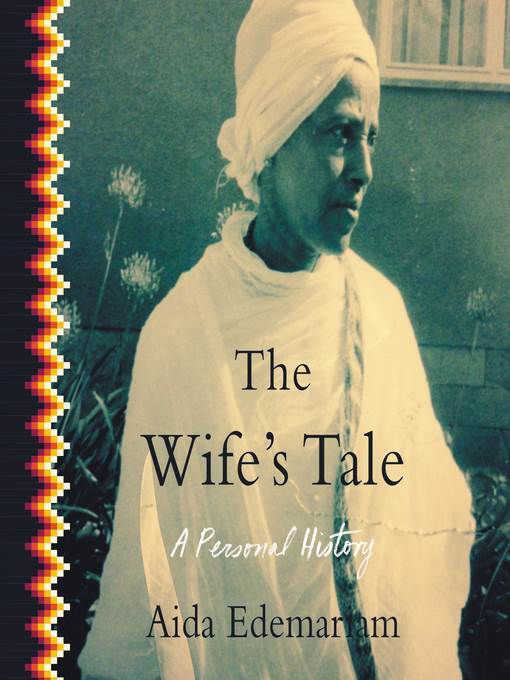
The Wife's Tale
A Personal History
کتاب های مرتبط
- اطلاعات
- نقد و بررسی
- دیدگاه کاربران
نقد و بررسی

Adjoa Andoh expertly narrates the author's memoir of her grandmother's life, spanning twentieth-century Ethiopia. The narrative jumps between childbirth, politics, and religion, but any confusion is allayed by Andoh's many vocal inflections. In a setting where women's roles are limited (the "wife" here is Yetemegnu, who is 8 years old at her marriage), the rituals of home are paramount. As Edemariam provides vivid descriptions of foods and their preparation and Yetemegnu's care of her husband and children, Andoh brings these details to life with a deft command of Amharic phrases. Ultimately, the illiterate Yetemegnu is granted an audience with Emperor Haile Selassie to clear her husband's name and to fight for her land. Andoh narrates these scenes in a manner that belies Yetemegnu's supposed powerlessness. M.P.P. � AudioFile 2018, Portland, Maine

July 1, 2018
Within the first few minutes, the chameleonic Adjoa Andoh quickly grabs listeners' attention with the high-pitched ululating trilling that will repeat throughout the almost ten hours of narration here. Ethiopian Canadian journalist Edemariam couldn't have found a better narrator to embody her late nonagenarian grandmother, through whose long life Edemariam also presents the multilayered history of 20th-century Ethiopia. Married at age eight to a 30-year-old priest with poetic tendencies, Yètèmegn bears witness to almost a century of jarring events, the private and public inextricably linked. The children she bears and those she loses, her husband's rise to power and his imprisonment, her struggle to keep her family's lands, her determination to raise and educate her surviving children dovetail with the tumultuous, often violent decades of Ethiopia's imperial rule, Italy's invasion, famine, coup d'état, dictatorship, and revolution. Where the text occasionally lags with unnecessary detail and disjointed digression, Andoh deftly commands the narration with an authority clearly reflective of Yètèmegn's own storytelling prowess. VERDICT For cosmopolitan audiences in search of intriguing, historically linked true stories, look to this Wife's Tale both to entertain and enlighten. ["An intriguing depiction of a remarkable life": LJ 3/1/18 review of the Harper hc.]--Terry Hong, Smithsonian BookDragon, Washington, DC
Copyright 2018 Library Journal, LLC Used with permission.

February 1, 2018
A Guardian journalist tells the story of her Ethiopian grandmother's remarkable life.In this ambitious, elegantly descriptive, but occasionally disjointed narrative, Edemariam interweaves the story of her grandmother Yetemegnu's eventful life with the tumultuous history of Ethiopia. Yetemegnu was born in the northern Ethiopian city of Gondar in 1916. Born into a well-respected family, she was married off to Tsega, a 30-year-old "nonentity" of a priest "from the sticks" of neighboring Gojjam before she was 10 years old. Against expectation, however, Tsega proved his worth to Yetemegnu's family by petitioning for, and earning, the position of chief priest of Gondar from the Ethiopian empress at the time, Zewditu, a year after his marriage. Edemariam's grandmother saw her husband's fortunes rise with the coming of a new ruler, the Emperor Haile Selassie, as she entered motherhood in her early teens. By the time she had given birth to her sixth child and buried a son, Italy had invaded Ethiopia and declared war on its former "ally in the Horn of Africa," Britain. After Italy left and Selassie returned from exile, Yetemegnu witnessed her husband's fall from political grace, his imprisonment for supposed "plots against the emperor," and his death shortly after his release. The newly widowed mother of nine fought to successfully convince the emperor to restore her land that Tsega's enemies had stripped from her family while stubbornly refusing to remarry. Yetemegnu then watched her children begin lives in lands as far away as Canada while Ethiopia descended into a long and bitter civil war. At times profoundly lyrical and other times fractured and difficult to follow, Edemariam's book offers a glimpse into a singularly fascinating culture and history as it celebrates the courage, resilience, and grace of an extraordinary woman.A flawed but richly evocative tale of family and international history.
COPYRIGHT(2018) Kirkus Reviews, ALL RIGHTS RESERVED.

February 1, 2018
Edemariam's grandmother Yetemegnu married Tsega Teshale, a poet-priest, at age eight. As Yetemegnu grew to adulthood, she learned her role as the lady of the house in Gondor, Ethiopia, and raised her children. During her lifetime, she experienced crises and changes in Ethiopia, including the Italian invasion and occupation during WWII, Allied bombing that forced her family to flee, revolution, and famine. Along with the national tumult, Yetemegnu lived through personal joys and many tragedies, including the death of children and her husband's imprisonment. She petitioned the emperor to clear her husband's name and regain land that had been seized by other priests. Her determination inspired one of her children to study law. Edemariam, a journalist who works in the UK and North America, paints a rich portrait of her grandmother's full life, telling Yetemegnu's stories through lyrical prose interspersed with poetry, prayers, and legends. Readers will appreciate Edemariam's workpart memoir, part historyfor its personal look at an eventful century in Ethiopia.(Reprinted with permission of Booklist, copyright 2018, American Library Association.)

























دیدگاه کاربران